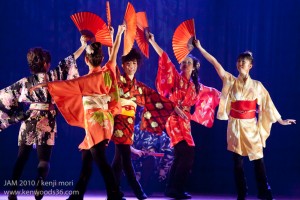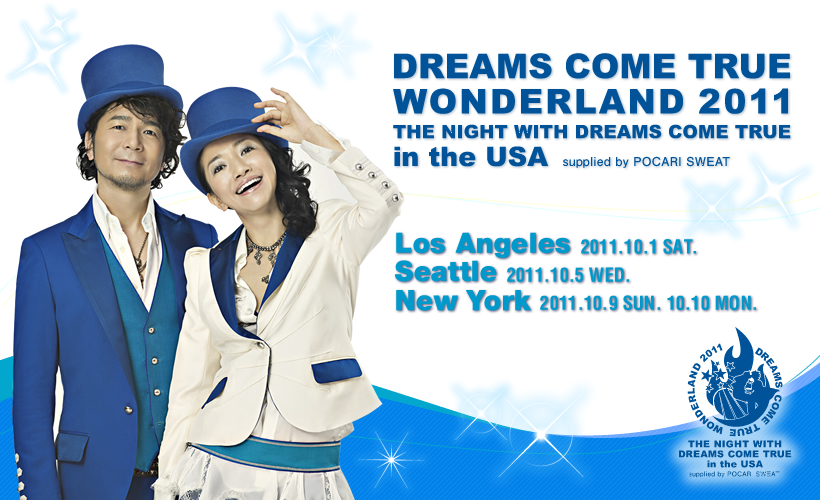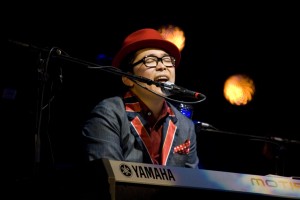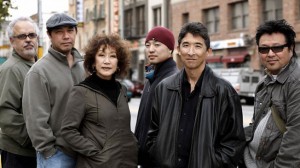Justin’s Japan: L’Arc~en~Ciel Marks 20 Years in Rock with Special Film Screening
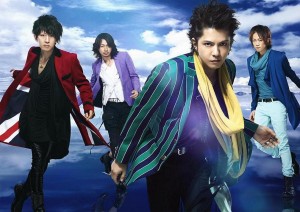
'The Best of L'Arc~en~Ciel 2 Days Live at Tokyo Ajinomoto Stadium' premieres Nov. 29 in New York. (Courtesy of Live Viewing Japan)
By JQ magazine editor Justin Tedaldi (CIR Kobe-shi, 2001-02) for Examiner.com. Visit his page here for related stories.
After 20 years, 13 million albums and 16 million singles sold, famed J-rock group L’Arc~en~Ciel is ready for its next career highlight: New York City.
On Nov. 29, movie theaters in Times Square and Union Square will unveil a special one-night-only music event for the band, which will be simulcast in eight other major American cities. The screening comes months ahead of their hotly anticipated live debut at the Theater at Madison Square Garden in March 2012.
Entitled The Best of L’Arc~en~Ciel 2 Days Live at Tokyo Ajinomoto Stadium, the concert film celebrates the group’s 20th Anniversary, traces their colorful history, and captures them in action at a gig last year that drew over 100,000 fans. The screening is presented by Live Viewing Japan in partnership with Maverick DC Group.
Live Viewing Japan is a distribution company focused on bringing Japanese entertainment media to an international audience. In New York earlier this month, they screened a concert showcase by superstar virtual idol Hatsune Miku (read this Examiner’s review here), and L’Arc~en~Ciel’s film has already made the rounds in São Paulo, Jakarta, Singapore, and will beam its way to London next month.
For the complete story, click here.
Hibari-sensei: THE LAST DAYBREAK by exist†trace
Jen Wang (Miyagi, 2008-09) is a lab tech in Dallas and a staff writer for the Japanese music website Purple SKY. Her love of cosplay and her junior high school students inspired the name for her own Japanese pop culture blog, Hibari-sensei’s Classroom.
Recently I wrote a review of THE LAST DAYBREAK, the latest EP by exist†trace, for Purple SKY. The all-female J-rock band made their major label debut this past June and are now gearing up for a U.S. tour. They will play in Boston, New York, and Philadelphia, as well as Tekkoshocon in Pittsburg, in March.

THE LAST DAYBREAK opens with a primal call from Jyou, but instead of singing in her trademark growling alto, she keeps her voice light and clear in “Daybreak ~Jyusan gatsu no shikisai.” Unexpected moves like these are the highlight of exist†trace’s new album.
Read the rest of the review here.
Justin’s Japan: Japan Arts Matsuri 2011 presents amateur night, guest stars, charity showcase
By JQ magazine editor Justin Tedaldi (CIR Kobe-shi, 2001-02) for Examiner.com. Visit his page here for related stories.
For every Japanese artist and entertainer in New York with a dream to make it big, the ninth annual Japan Art Matsuri (JAM) is the place for their star to shine. Held this year from Nov. 4-6 at the Theater for the New Cityin Manhattan’s East Village, this year JAM 2011 offers its biggest and most diverse lineup to date.
Hosted by Yoshi Amao and Saori Goda and presented by JaNet in association with Faune Dance Troupe, JAM 2011 has established itself as one of America’s largest Japanese art and music festivals, presenting Japan and its unique culture with performances by Japanese artists, musicians and entertainers in a true matsuri (festival)-style atmosphere, and to enhance friendship and communication among New York City’s cultural communities.
More than 1,000 people are expected to attend the three-day event that features, in addition to live entertainment, a variety of street stall-style shops in the theater lobby that sell everything from Japanese food and drinks to artworks and traditional goods. There will also be charity booths to help those in Japan devastated by the 3/11 Tohoku earthquake and tsunami disaster.
For the complete story, click here.
JQ Magazine: Concert Review – DREAMS COME TRUE in New York City
By David A. in Virginia, special to JQ magazine.
Japanese mega-band DREAMS COME TRUE (ドリームズ・カム・トゥルー a.k.a. ドリカム) made a very rare U.S. appearance at the Highline Ballroom in New York City on October 9, the first of two shows that sold out within days of their announcement in July. Many thanks to fanpage DCT Joy for notifying its members of this wonderful event. For those of us not in New York, Los Angeles, or Seattle, we otherwise might not have known about it.
At dusk, around 6:30, the line already was down the block for admission to the inconspicuous Highline Ballroom in Chelsea. On this unseasonably warm October Sunday evening, the anticipation was palpable, the “DCT Joy” bringing alive the night. One walks upstairs to the ballroom, spare and easy to navigate. The management asks those seated on the floor of the “pit” to stand so that the crowd can fill the room.
First of all, a big shout-out to Justin Tedaldi (Kobe-Shi CIR, 2001-02) at JQ magazine. This reviewer cannot thank you enough. Also, thanks to Reiko from the DCT organization for her kind words.
Prior to the show, the house PA played a recording of some of DCT’s most well-known melodies, such as “Ano Natsu no Hanabi” and “Ureshii! Tanoshii! Daisuki!”, performed on soft bells.
Promptly at 8:00, introductions were made first by a woman in Japanese, to great enthusiasm from the audience; then a man said, “New York City! Are you ready for DREAMS COME TRUE?!” “A theme of the WONDERLAND” played as the fifteen-piece band-and-dance ensemble walked on stage, followed by Masato Nakamura (中村 正人). Although the Highline Ballroom has a standing capacity of 700, with a few dozen dinner tables on the balcony, the roar from the crowd was as if they were in an arena. With the theme concluded, Miwa Yoshida (吉田 美和) arrived, with her hair tied back and wearing a loose-fitting, light pink outfit; and, with her familiar exclamation “DREAMS COME TRUE in WONDERLAND….!!!”, the band launched into a heavy version of “Nando Demo,” as the crowd danced, waved, and cheered, encouraged by Miwa in all of her boundless energy.
Articles by JET journalist Patrick St Michel featured in The Atlantic
Current Mie JET Patrick St. Michel has two articles currently featured in The Atlantic online.
- “The 48 Japanese Schoolgirls Aiming to Take Over the World” – The global ambitions of J-Pop group AKB48
- “How Korean Pop Conquered Japan”
Click here to read other writings by Patrick featured on JETwit.
JQ Magazine: Concert Review — Japan Society Hosts J-Pop Showcase with Yu Sakai and Cibo Matto
By Vlad Baranenko (Saitama-ken, 2000-02) for JQ magazine. Vlad is an avid photographer.
On Oct. 20, New York’s Japan Society held a sold out co-headlining performance by hometown heroes Cibo Matto and the Japanese singing sensation Yu Sakai in his international debut. Whether an aficionado of jazz, hip-hop, R&B or pop, the catchy synth beats of the girl duo and Yu Sakai’s melodic voice left an indelible impression on everyone in attendance.
Billed as J-Music Ride, the show opened with a set of fantastic vocal performances by Sakai. The breakout singer, whose professional music career kicked off in 2009 when his single titled “Story” became a radio hit, has quickly become one of Japan’s most admired artists, earning him the iTunes “J-Pop Best Album of 2010.” In June of this year, Sakai released his long-awaited album Yes!!, and those lucky enough to have attended the show (Yu Sakai’s only performance in the U.S.) were given an opportunity to sample many of the new tracks like “Train.”
Departing from the standard band format, the majority of instrumental sounds in Sakai’s pieces were recorded by the artist himself. At Japan Society, the artist would beatbox into the microphone to create a looping background rhythm, simulating a multi-layered chorus-like effect by sampling his own voice. He would then insert a fast paced piano tune, and the resulting melody astounded the audience, prompting whistles and applause during the song. To appease the American audience, Sakai-san surprised the concert attendees with his beautiful rendition of Michael Jackson’s “Rock with You.” In between pieces, Sakai would talk to the sold out crowd in a very nonchalant manner (he previously lived in Los Angeles), often making fun of himself and telling people to not be afraid to visit Japan. The obvious raw talent of Yu Sakai made this rare appearance a true gem, and the standing ovation from the audience at the end of his performance proved that this young artist can look forward to a bright future ahead.
JQ Magazine: JQ&A with Peelander-Yellow of Alien Punk Band Peelander-Z
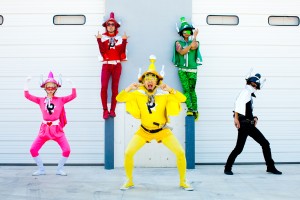
Peelander-Yellow, center: "I don't care about Band!!!!! We never 'play' music!!!!! We just want to 'play' with youuuuuu!!!!! Come to see our show then check it yourself!!!!!!!!" (Whitney Lee)
By Justin Tedaldi (CIR Kobe-shi, 2001-02) and Vlad Baranenko (Saitama-ken, 2000-02) for JQ magazine.
Psychedelic, seizure inducing, and fantastically successful in their ability to cause absolute sensory overload during their intergalactic performances, Peelander-Z is back. The colorful Japanese punk group hailing from the Z area of Planet Peelander returns to New York City (where it formed in 1998) for their latest tour behind their new album Super DX Hitz.
Those yearning for their Peelander-Z fix will have the opportunity to experience all the colorful mayhem at the Bowery Poetry Club on Oct. 22. In this exclusive interview, we interrogate Peelander-Yellow to reveal the deepest secrets of their cosmic travel, their mastery of the chaos theory, and what the future holds for the ongoing kaiju saga.
Tell us about Peelander-Z’s Super DX Hitz album.
You can hear our all Hitz songs and understand Peelander-Z world!!!!!!!
28 happy songs and 5 Karaoke DVD!!!!
Get it for your Mom, because your Mom wants dance with youuuuuuuuuu and Peelander-Z!!!
How do you come up with the themes for your songs?
All ideas come from my sweet yellow brain when I eat medium rare S.T.E.A.K., Tacos, Ice Cream~~~~~!!!!!
What inspired you to form the band?
I don’t care about Band!!!!!
We never “play” music!!!!!
We just want to “play” with youuuuuu!!!!!
Come to see our show then check it yourself!!!!!!!!
Who is Peelander-Yellow and what’s his story?
I’m not Peelander-Red!
I’m not Peelander-Green!
I’m not Peelander-Pink!
I’m not Peelander-Black!
Yes, I’m Peelander-Yellow for youuuuuuuu!!!!!!
I was born from Banana on Planet Peelander!!!!!
That’s why I love it!!!!!
Please bring it for meeeeeee!!!!!
Justin’s Japan: Hiroshima lends its divine sound to NYC Japan benefit concert
By JQ magazine editor Justin Tedaldi (CIR Kobe-shi, 2001-02) for Examiner.com. Visit his page here for related stories.
A staple of the Los Angeles jazz scene since 1974, Hiroshima returns for an East Coast engagement tonight (Sept. 21) to headline a Japan relief benefit concert with special guest stars at New York’s B.B. King Blues Club & Grill.
The only Asian American band to have been nominated for a Grammy, the group’s most recent album, 2009’s Legacy, celebrates Hiroshima’s 30th anniversary of recording and serves as a re-visitation of songs (like the easy listening favorite “Roomful of Mirrors” and ’80s hit single “One Wish”) from the band’s first decade.
Led by original members Dan and June Kuramoto, the group proved itself a musical chimera from the start with its self-titled debut, mixing elements of jazz, pop, and R&B with traditional Japanese instruments. Dan has remarked that at the time in America, music was the only outlet of cultural diversity available, and the resulting disc was a pioneering voice in the world music movement that followed.
For the complete story, click here.
JQ Magazine: DVD Review — ‘Live from Tokyo’ Explores Music’s Japanification
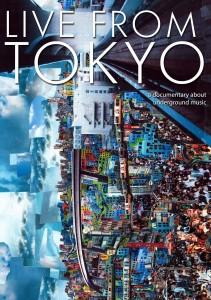
"What makes this film so unique is how the visuals compliment the subject matter. The music becomes more visceral when scenes from Tokyo’s fluorescent nightlife are flashing on the screen." (Good Charamel Records)
By Sam Frank, an ALT who taught English in Hiraizumi-Cho, Iwate-ken, from 2002-04 and worked in Shirahama-cho, Wakayama-ken as a JET from 2004-06, for JQ magazine. He currently manages the New York division of UnRated magazine and works as a project manager/Web producer at Arrow Root Media.
When it comes to cultural diversity, Japan has always been a borrower. Their entire writing system, known as kanji, is made up of Chinese characters; the country’s most popular sport is baseball, America’s pastime; and South Korean television dramas get all the top ratings. Japan’s music scene is no different. In Live from Tokyo, American director Lewis Rapkin takes us on a kaleidoscopic journey through Tokyo’s bustling underground music scene. Set within the backdrop of the modern Japanese megalopolis, the film explores Tokyo’s eccentric music culture, and how a combination of global information, media-saturated urban areas, and cutting edge innovation has impacted it.
“Since the 2000s, when the Internet became widely used, the number of people listening to underground music has been growing,” explains Murata, lead singer of the band Kuruucrew, during one of the film’s many fascinating interviews. There are many facets to Japan’s underground music scene, and Rapkin captures them beautifully. Early on in the film we learn how MP3s and digital downloads have altered Japan’s musical landscape. TokyoGigGuide.com’s Craig Eaton describes how you can now “get albums online, whereas in the past you’d have to wait until it came to your country or order it, and wait for it to come in the mail.” With a simple click, you can now access Japanese underground artists such as Shugo Tokumaru, Sexy-Synthesizer, and Sajjanu.
When we’re not learning about the underground scene through band interviews, Rapkin gives us an all-access pass to the bands as they perform on stage. Juxtaposed with time lapses of Shibuya’s nightlife, first person views from train lines, and kaitenzushi conveyor belts, we hear punk rock, J-pop, heavy metal, traditional Japanese music, and various synthesizer-based experiments.
For the complete story, click here.
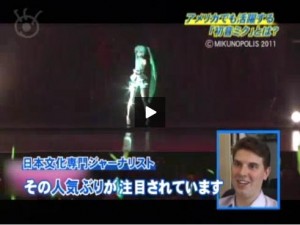
JQ magazine editor Justin Tedaldi talks Hatsune Miku on FCI's "Today's Eye" segment. (Courtesy Fujisankei Communications International)
JQ magazine editor/Japanese Culture Examiner Justin Tedaldi (CIR Kobe-shi, 2001-02) was recently interviewed by Fujisankei (FCI) News on Japan’s virtual pop idol Hatsune Miku for their “Today’s Eye” segment broadcast this week on Japanese TV!
Miku is the star of Toyota’s summer Corolla ad campaign in the U.S., and earlier this month performed to massive crowds at L.A.’s Nokia Theatre and the San Diego Comic-Con! Check out the video here or click on the image for Justin’s comments.
Direct link: www.fujisankei.com/video_library/event/hatsunemiku.html
Dreams Come True to hold rare concerts in U.S. Any JET alums going?
Just heard from Aaron Woolfolk (Kochi-ken) (writer and director of the film “The Harimaya Bridge”) that he’s going to the Dreams Come True concert in L.A. in October and that they’ll also be playing concerts in Seattle and NYC as well as free concerts in Iwate, Miyagi and Fukushima.
Here’s a June 28 post about the concerts from Anime News Network.
If you’re a JET or JET alum and plan on going, post a comment here and let the JET alum community know.
Hibari-sensei: Seikima II Press Conference
Jen Wang (Miyagi, 2008-09) is a lab tech in Dallas and a staff writer for the Japanese music website Purple SKY. Her love of cosplay and her junior high school students inspired the name for her own Japanese pop culture blog, Hibari-sensei’s Classroom.
A-kon , Dallas, Texas’ longest-running anime convention, always bring interesting musical acts from Japan. This weekend, rock bands Blood Stain Child and D will be performing. At last year’s convention, I had the opportunity to attend a press conference with Seikima II. To celebrate their 25th anniversary, the heavy metal band reunited and embarked on the world tour, with Dallas as their first stop. The day after their high energy concert, or “black mass” as it is called among Seikima II fans, they sat down with reporters to answer questions about their music, goals, and efforts to spread both Japanese and akuma culture.
Your site says that you have returned with a new mission. What is your new mission?
Demon Kakka: To propagate ourselves throughout the world. We decided to have a reunion to see how the seeds of world domination have grown.
What made you decide to reunite and spread music to the U.S.?
Demon: There have been many offers, including collaboration with anime. We decided to use the popularity of anime to check out the scene in America.
Even though you claim to be devils, you seem like saints to me.
Demon: [in English] Devils, angels, saints, and Buddhas…I wonder what the difference really is between them. It all depends on what you think which is which.
Why did you choose to propagate Japanese culture?
Demon: The Japanese have a fascinating culture, but the people are not able to go out to spread it. If more Japanese could go out to spread their culture, there would be better communication.
Your songs have very vivid images and ideas. When you are writing lyrics, do you begin with an image, feeling, or story in mind?
Luke Takamura: A keyword is important. From there, the story comes. Sometimes, the melody comes first.
Jail O’Hashi: [in English] Recently I have been writing with Demon as a team. We think about what are things that can be expressed as Seikima II… pinpoint social and economic problems. Those things are important to be expressed in rock music.
Demon: Sometimes the melody is made and the lyrics come. Other times, I start with a story or notes. The ideas can from anywhere even people on the bus or train. When I’m riding the train, I’m in my human disguise so I can write lyrics without anyone knowing.
To read the rest of the interview, click here.
Justin’s Japan: Q&A with Grammy Award-Winning Musician Hiromi on ‘Voice’
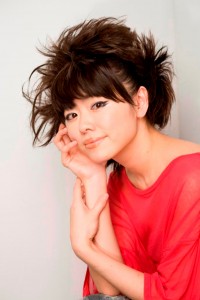
"I went back to Japan right after the earthquake and did a lot of live radio and TV shows to perform live to cheer people up. I just wanted to do something for the country I love and only thing I could do was keep playing music, so I kept playing." (Sakiko Nomura)
By JQ magazine editor Justin Tedaldi (CIR Kobe-shi, 2001-02) for Examiner.com. Visit his page here for related stories.
A native of Hamamatsu, Shizuoka, pianist and composer Hiromi Uehara is one of the world’s top young international performers in jazz, winning a Grammy earlier this year for her work on Stanley Clarke’s most recent album. Today (June 7), she releases Voice, her seventh studio effort since 2003 and first as part of the Trio Project with bassist Anthony Jackson (Paul Simon, the O’Jays, Steely Dan, Chick Corea) and drummer Simon Phillips (the Who, Judas Priest, David Gilmour, Jack Bruce).
“When I play music, I realize that it really filters emotions,” says Hiromi. “I called this album Voice because I believe that people’s real voices are expressed in their emotions.” Tonight, the Berklee College of Music alum launches a six-night residency at New York City’s venerable Blue Note Jazz Club as part of its inaugural Blue Note Jazz Festival. I caught up with the artist in this exclusive interview.
What kinds of goals in mind do you have when you record a new album? How about for a concert?
Making an album is like I have stories to tell; I want to see the landscape in music that I have never seen before. For a concert, I always think today is my first and last, trying to put everything I have out.
A big part of your style is your quicksilver runs across the keys. How did you develop this as your trademark, and are there ever times in concert when you feel like it’s a challenge to keep up that manic pace?
I never really thought about it as my trademark, I just play what I hear, what I have to say at that very moment, just like a conversation.
The toughest part of your job onstage that the audience might not realize is…
Definitely traveling.
I’ve noticed that you’ve been speaking a lot more English for interviews and at your concerts. Are you continuing to study it, and what kind of methods or techniques do you use that you can recommend to others who are learning a second language?
I do watch a lot of movies in English. Don’t be afraid to make mistakes, speak speak speak!
In what ways has the Japanese music community banded together in the wake of the earthquake and tsunami devastation? What has your impression been of the United States and its entertainers’ relief efforts?
I went back to Japan right after the earthquake and did a lot of live radio and TV shows to perform live to cheer people up. I also went back in April to do eighteen benefit shows in Tokyo. I just wanted to do something for the country I love and only thing I could do was keep playing music, so I kept playing. I really would like to thank everyone from the U.S. for their efforts. We surely need continuous support and I will keep doing whatever I can do.
For the rest of the interview, click here.
Justin’s Japan: Loudness, Akiko Yano Perform Rare Concerts in New York
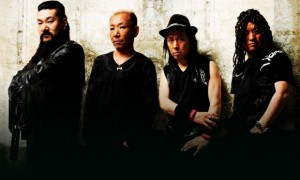
Legendary Japanese metal band Loudness return to Times Square's B.B. King Blues Club & Grill June 1.
By JQ magazine’s Justin Tedaldi (CIR Kobe-shi, 2001-02) for Examiner.com. Visit his page here to subscribe for free alerts on newly published stories.
After their successful tour of Europe last year capped with a headlining gig at Germany’s prestigious Bang Your Head!!! festival, Japan’s Loudness are invading North America for the first time since their sold out 2006 tour, and only the second time since 1991!
Formed in 1981 in Osaka, vocalist Minoru Niihara, guitarist Akira Takasaki (A.K.A. the Eddie Van Halen of Japan), bassist Masayoshi Yamashita and drummer Munetaka Higuchi joined forces to become not only Japan’s premier metal band, but a world class act in their own right, releasing five English-language albums in America in their heyday.
On June 1, the group storms Times Square’s B.B. King Blues Club and Grill, where they last played five years ago in a historic gig filmed for their Loudness in America 06 DVD. (The disc doubles as an epitaph for Higuchi, who succumbed to liver cancer two years later. He was replaced in 2009 by Masayuki Suzuki.)
Metal not your cup of cha? On June 3, Japan Society presents Akiko Yano Solo: Revealing Her Magic. This one-night-only appearance is billed as a concert and talk, exploring renowned singer-songwriter Akiko Yano‘s original music, as influenced and inspired by the unique rhythm and intonation of the Japanese language. In this performance, Yano demonstrates how she bends prose, phrases and salutations into her own musical expressions.
Japan Relief: “It Won’t Be Long Now” song and video by JET alum Shun Endo and The Liquid Now
***************
JET alum Shun Endo (Ibaraki Prefecture, 1998-2001) (Treasurer and Webmaster for JETAA Pacific Northwest and creator instantnoodlescomics.com) and his band The Liquid Now have released a music video titled “It Won’t Be Long Now“ intended to draw attention to and help fundraise for Japan relief efforts.
From Shun Endo and The Liquid Now:
IT WON’T BE LONG is about overcoming the tsunami and earthquake in Northern Japan. It was a chance for us to really reflect on their struggle, and beyond. To us, the Japanese festivals encompass the beauty of the culture. We’ve experienced nothing like it. It is a time of strong community, tradition, abandon, and joy. We hope the areas affected will heal enough to enjoy themselves once again soon.
All band sales will be donated, so just donate directly to the Seattlejapanrelief.org who work with Red Cross and Peacewinds.
For a digital copy of the song, visit www.theliquidnow.com and/or email theliquidnow@gmail.com
Thank you for listening. 日本の皆さん、頑張りましょう。
The Liquid Now are a band from Seattle that is influenced by British music and Japanese culture. www.theliquidnow.com
(we hope people don’t mind us using their online photos as this is for a good cause, and we will donate anything that comes our way.)

